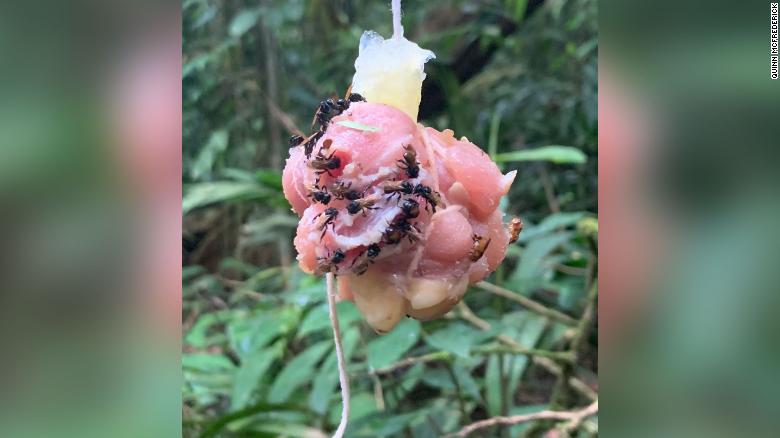Turkey coup attempt: Erdoğan demands US arrest exiled cleric Gülen amid crackdown on army – as it happened
Table of Contents
ToggleSummary
We’re going to pause our live coverage of the failed coup by a Turkish military faction, its defeat at the hands of protesters, police and loyalists, and the subsequent crackdown in the military and courts by victorious president Recep Tayyip Erdoğan.
The attempted coup
- On Friday night a faction of the Turkish military tried and failed to stage a coup to overthrow Erdoğan, and tanks, helicopters and soldiers clashed with police and protesters in the streets of Istanbul and Ankara.
- Erdoğan delivered an iPhone address to the nation, calling on people to resist the coup and defend their democracy. Thousands turned out, and the president landed in Istanbul, where he denounced the “treason” by the rebellious faction.
- Parliament was struck by at least one bomb, and graphic videos and photos social media showed clashes, surrenders and chaos.Helicopters fired at people on the ground, mobs grappled with soldiers, and tanks barreled through crowds or were overrun by protesters. On Saturday the defense minister said the control was fully in control of the government.
- At least 265 people were killed in the violence and at least 1,440 wounded. Prime minister Binali Yildirim said on Saturday that 161 “martyrs” were killed, including civilians and police. The general acting as chief of staff, Umit Dundar, said earlier in the day that 104 “coup plotters” were killed in the fighting.
- Barack Obama, Angela Merkel and other world leaders condemned the coup. “All parties in Turkey should support the democratically-elected government of Turkey, show restraint, and avoid any violence or bloodshed,” the US president said.
The aftermath
- Authorities arrested 2,839 army members and ordered 2,745 judges and prosecutors detained, as officials began to purge the ranks of accused conspirators.
- Erdoğan demanded that Obama arrest or deport an exiled cleric, Fethullah Gülen, from his home in Pennsylvania. Secretary of state John Kerry said the US would consider extradition but required evidence of the imam’s wrongdoing.
- Gülen rejected the conspiracy accusations in a rare interview with the Guardian and other reporters, and suggested that Erdoğan could have staged the coup. He also condemned the coup attempt, saying, “now that Turkey is on the path to democracy, it cannot turn back.”
- Turkey shut down US military flights from a base near the southern border, which the foreign minister said was because conspirators had been stationed there. He promised that air strikes from the base would resume after anti-coup operations, but the halt has disrupted the campaign against jihadi militants in Syria.
- Yildirim said that Turkey would consider reinstating the death penalty to punish coup-plotters and the “black stain” they had left on the nation’s democracy.
- Turkey’s four major parties denounced the attempted coup, including those that have vehemently opposed Erdoğan’s AKP. But fears remained that the pro-democracy protests may have emboldened Erdoğan’s increasing authoritarianism.
- Anti-coup demonstrations returned to the streets of Istanbul and Ankara, where police restored order and a celebratory mood reigned. Injured people still waited for medical care at Ankara’s biggest hospital, and people recounted scenes of horror and death from clashes with tanks and soldiers the night before.
- Two Turkish majors, a captain and five privates requested asylum in Greece after landing in a military helicopter. Greece’s defense ministry acknowledged a landing near Alexandroupolis, and said the passengers were arrested for illegal entry.
Defense minister: government has total control
Defense minister Fikri Isik has said forces loyal to president Recep Tayyip Erdoğan have regained full control of all areas in Turkey, but warned that authorities will stay on high alert for any continued threat.
AP reports:
The uprising appears not to have been backed by the most senior ranks of the military. General Umit Dundar said the plotters were mainly officers from the Air Force, the military police and the armored units.
But Turkish authorities have detained General Adem Huduti, commander of the Second Army, and Alparslan Altan, one of the judges on Turkey’s highest court. There are also unconfirmed reports that General Erdal Ozturk, commander of the Third Army Corps, was detained, according to an unnamed official cited by Reuters.
What is the Gülenist movement, and why does Recep Tayyip Erdoğan consider it an existential threat?
My colleagues in London explain, and Amana Fontanella-Khan reports from Fethullah Gülen’s compound in central Pennsylvania.
Peaceful demonstrations are continuing around Turkey – with remnants of the attempted coup still standing scattered on the streets and the question hovering of how far will Erdoğan go in his retaliation.
Defiant Turks defended their democracy on Friday night – but not necessarily the man elected by that democracy, Recep Tayyip Erdoğan, the Guardian’s Istanbul correspondent Constanze Letsch reports.
“The resistance against the coup attempt last night was quite heterogenic,” said Erol Önderoglu, Turkey’s Reporters Without Borders representative who is currently on trial on terrorist propaganda charges after participating in a solidarity campaign with a pro-Kurdish newspaper.“The most valuable outcome of last night’s events is that many people who are not AKP supporters stood up for democratic values despite the recent crackdowns on the opposition, and despite the tension and the polarisation of the country.”
However, not everyone shared his optimism. “Everyone spoke out against the coup last night and that gave me hope,” said an academic who wished to remain anonymous. “But watching events unfold today this hope has shrunk quickly. Last night there was the possibility that the government would use this to return to a more unifying language, to return to the peace talks, to unite the country. But today it looks like they will use [the coup attempt] simply to consolidate power.”
The academic said that the trauma of past military interventions, and not sympathy for the government, drove people to oppose Friday night’s bloody coup attempt.
“These people do not support Erdoğan, but they oppose the idea of a military coup. Turkey has a history of very painful, traumatic military interventions, so I was not surprised to see such united opposition to this attempt.”
Turkey has faced a number of military coups since the foundation of the republic in 1923. The military, once the most trusted institution in the country, has long defined itself as the guardian of the secular Turkey established by the country’s founder, Mustafa Kemal Atatürk. As recently as 1997, the army intervened and forced Turkey’s first Islamic-led government to resign.
But since 2007, when high-ranking military staff went on trial for an alleged coup attempt, trust in the military has waned considerably, and the AKP has long been credited with pushing the army back into the barracks and establishing civilian rule.
“Turkey has experienced a coup once every 10 years. Each time that happened, the country was thrown back by around 50 years,” said Levent Gültekin, an opposition writer and columnist. “The deaths, the torture, the horrible scenes in the street – all this is still very fresh in the collective memory in Turkey, and this memory is easily activated by scares of yet another military intervention.”
Evren, who died last year at age 97, left the country with a deeply undemocratic constitution, which, after being implemented in 1982, restricted the right to freedom of assembly and expression, seriously curtailed labour unions and put universities under strict state control.
Gültekin underlined that this was the first time that civilian resistance forced the army to back down from a violent intervention. “That is of course a good thing. But the real question is how these crowds who professed their loyalty to Erdoğan, will be used,” he said.
“Some of the people we saw on the streets are people who do everything Erdoğan asks them to do. He has turned voters into militant followers. It would be a positive development if the government will use them to further democracy, but if they are used to further authoritarianism, it would be a catastrophe.”
For the moment, however, fears that Erdoğan will undermine what Turks have achieved were overwhelmed by celebration of that very achievement.
Anti-coup demonstrators, nearly all of whom draped in the red and white of the Turkish flag, have taken to the streets in cities around the country as their leaders asked them. Earlier on Saturday the president and prime minister called on people to return to pro-democracy demonstrations in case of a “second coup” attempt.
My colleague Kareem Shaheen is in the capital, Ankara, and Ghaith Abdul-Ahad is in Kassimpasa, president Recep Tayyip Erdoğan’s Istanbul neighborhood.
Large crowds of several thousand people have gathered in Ankara’s central Kilizay Square, where Prime Minister Binali Yildirim was scheduled to make an appearance – but failed to show. The crowd hung around with several large portraits of Erdogan declaring him “Benim Baskanim” – “my president”.
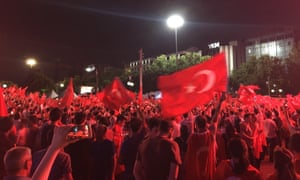
In Kassimpasa, flag waving crowds of mostly religious and conservative people – the backbone of Erdoğan’s ruling AKP party – were whipped to a frenzy by a speaker telling them: “you stood for your neighbor! Recent Tayyip is our son, and we went into the street to defend him!”
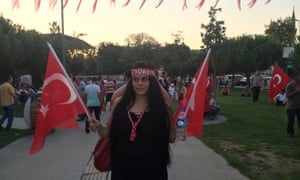
The crowd responded with songs repeating Erdoğan’s name, kids on motorbikes drove by waving flags and chanting and a stocky and bearded religious student named Emirrat said he would not leave the celebration for anything.
“I haven’t slept for 29 hours, this a very good day for us but the struggle will continue.”
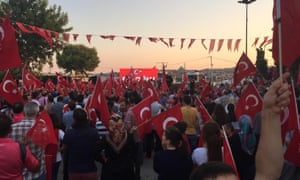
Elsewhere in Istanbul, crowds have swarmed onto the main thoroughfares and most famous streets of the city.
What we know
As night falls almost a full day after a group within the military tried to stage a coup, president Recep Tayyip Erdoğan has reasserted control, detained thousands of people in the military and courts, and demanded that Barack Obama arrest or deport a political opponent.
- On Friday night a faction of the Turkish military tried and failed to stage a coup to overthrow Erdoğan, and sent tanks, helicopters and soldiers clashed with police and protesters in the streets of Istanbul and Ankara.
- An estimated 265 people were killed in the violence, though authorities have given distinct tallies. Prime minister Binali Yildirim said on Saturday that 161 “martyrs” were killed, including civilians and police, and that at least 1,440 people were wounded. The general acting as chief of staff, Umit Dundar, said earlier in the day that 104 “coup plotters” were killed in the fighting.
- Loyalists arrested 2,839 army members and ordered detained 2,745 judges and prosecutors, as Erdoğan’s government began to purge the government and military ranks of suspected dissidents.
- Erdoğan demanded that Barack Obama arrest or deport an exiled cleric, Fethullah Gülen, from his home in Pennsylvania. Secretary of state John Kerry said the US would consider extradition but required evidence of the imam’s wrongdoing.
- Gülen rejected the conspiracy accusations in a rare interview with the Guardian and other reporters, and suggested that Erdoğan could have staged the coup. He also condemned the coup attempt, saying, “Now that Turkey is on the path to democracy, it cannot turn back.”
- Yildirim said that Turkey would consider reinstating the death penalty to punish coup-plotters and the “black stain” they had left on the nation’s democracy. Erdoğan, in Istanbul after an extraordinary iPhone address on Friday, vowed to “clean up” the military and government of enemies.
- Anti-coup demonstrations returned to the streets of Istanbul and Ankara, where police restored order and soldiers surrendered in tense scenes around the cities. Injured people still waited for medical care at Ankara’s biggest hospital, and people recounted scenes of horror and death from clashes with tanks and soldiers the night before.
- Parliament resumed sessions amid rubble from at least one explosion Friday, and all the major parties, including those that have vehemently opposed Erdoğan’s AKP, denounced the attempted coup.
- Two Turkish majors, a captain and five privates requested asylum in Greece after landing in a military helicopter. Greece’s defense ministry acknowledged a landing near Alexandroupolis, and said the passengers were arrested for illegal entry.
- The Pentagon lost Turkish airspace access and was forced to stop flying from a southern base, which Ankara’s foreign minister explained by saying that suspected coup plotters were arrested at the base. He promised that counter-terror cooperation would resume as normal after anti-coup operations ended.
- Barack Obama, Angela Merkel, Donald Tusk and other world leaders condemned the coup in emphatic terms. “All parties in Turkey should support the democratically-elected government of Turkey, show restraint, and avoid any violence or bloodshed,” the US president said in a statement.
- At Numune hospital, the largest in Ankara, hundreds of wounded people have been brought for treatment, my colleague Kareem Shaheen reports.
Cagri, a 29-year-old, was wounded by shrapnel when a military helicopter fired at loyalist security forces in his neighborhood of Kazan. “We just panicked,” he said.
A friend of his who was 2 miles away died in the fire from helicopter machine guns, he said. A taxi driver nearby grabbed him and took him to the hospital, where he had to lie down outside waiting to be treated because of the huge crowds of victims seeking help. Another friend lost his hand, Cagri said, his own shrapnel wounds in his chest and leg, bandaged. He added that has lost all feeling in his injured thigh.
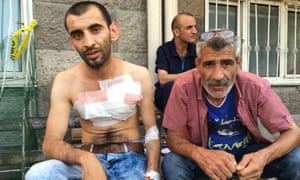
Cagri at the hospital in Ankara. Photograph: Kareem Shaheen Osman Konmaz, an EMT, said he treated between 350 to 400 people in the attack’s aftermath. He described the most heartbreaking cases he saw: one man who lost his leg after it was run over by a tank, and another when he saw the body of a man who was crushed by a tank controlled by the coup plotters.
“There was no humanity in any of this,” he said. Most of the injuries he saw were wounds from shrapnel or bullets. He said the incident took a grave psychological toll, and was even worse than the attack in Ankara last October by Isis that targeted a peace rally.
“This was the worst massacre I’ve ever witnessed,” he said, before alluding to a bombing months earlier. “At least October 10 was terror by a terrorist group, but this was done by our own military.”
Meanwhile people continued to gather at Kizilay Square, where prime minister Binali Yildirim is set to speak to the crowds.
People have started amassing in the streets and squares of Ankara, my colleague Kareem Shaheen reports from Kizilay Square, which is awash in waves of red Turkish flags.
There’s a carnival like atmosphere and a couple thousand protesters in Ankara’s Kizilay square, celebrating the coup’s defeat. Under towering portraits of President Erdogan that declare “we own democracy.”
Protesters are chanting “the martyrs will not die, the country won’t be divided,” “God is great,” and praising Erdogan amid music and jubilant flag waving. One chant said: “There is no left or right wing, only Ankara, the last castle.”
Ahmet, a 23-year-old protester, said he came to the demonstrations to stand alongside the elected president, saying he had also joined civilians who marched upon the presidential palace last night against the military.
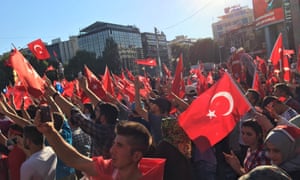
Ankara. Photograph: Kareem Shaheen “We are here together against it, and if they try a second time, we will stay here,” he said
A young couple who requested anonymity said they saw their presence as a defence of the homeland.
“They tried to divide our country,” said the man. “This is about our homeland and we will die for it, and they shot at us with their helicopters and their jets flew over our heads.”
The couple urged greater cooperation between Turkey’s political factions, saying the whole country was “one heart” in the immediate aftermath of the coup attempt.
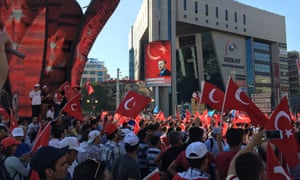
Ankara. Photograph: Kareem Shaheen In a rare interview with a small group of journalists at his residence in Saylorsburg, Pennsylvania, the reclusive Fethullah Gülen has told my colleague Amana Fontanella-Khan that he rejects all accusations that he was behind Friday’s coup attempt.
“I don’t believe that the world believes the accusations made by President Erdoğan,” Gülen said. “There is a possibility that it could be a staged coup and it could be meant for further accusations [against the Gulenists],” he said, a small prayer room, lined with woven rugs, decorated with Islamic calligraphy and leather bound religious books.
Gülen said he rejects all military interventions, and said he has personally suffered every time a coup has happened in Turkey in recent years. “Now that Turkey is on the path to democracy, it cannot turn back,” he said.
The last time the reclusive leader of the Gülen movement spoke live to international press was in 2014. Gülen rarely leaves the Golden Generation Worship and Retreat Center complex, where his movement offers religious instruction. The exiled imam is in fragile health. Before the interview he was attended to by a stethoscope-carrying physician who measured his blood pressure.
The sprawling compound is guarded by around the clock security. Following the news of the coup, Alp Aslandogan, the executive director of Alliance for Shared Values, and the media advisor to Gülen, said that security is on “high alert” following threats of violence on social media.
While Erdoğan is attempting to extradite Gülen for charges related to the coup Aslandogan said: “The US government position has always been that if there is any evidence of Mr Gulen breaking the laws, they will look into it.
“So far, the Turkish government hasn’t produced anything. Thank God, this is a country of laws, and we depend on that.”
Elaborating on the idea that Erdoğan may have staged a coup, Aslandogan noted Friday’s events did not match the pattern previous coups have followed: “The coup appears to be poorly planned, very poorly executed and everything seems to be paying into Erdogan’s hands.”
“There are many big question marks of how [this attempted coup] was executed,” he added.
[Source:- Guardian]





